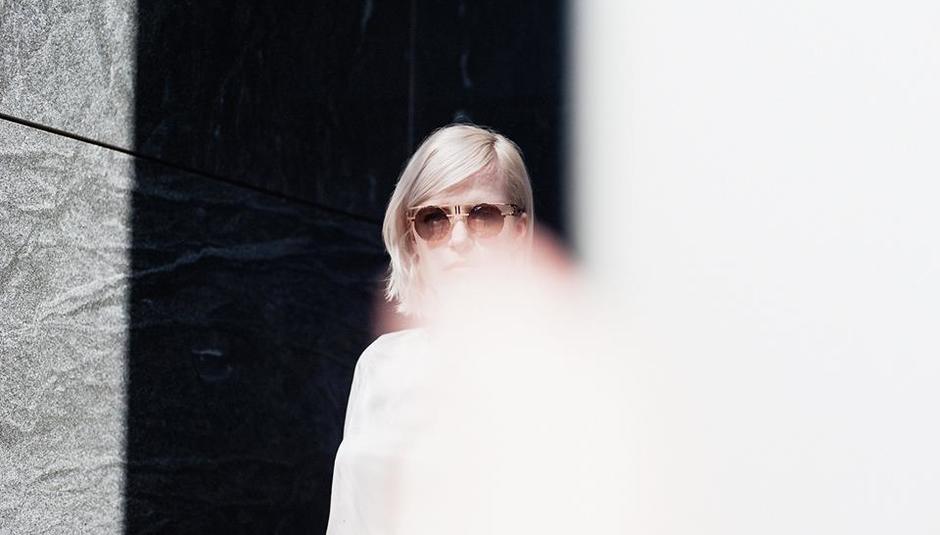This time last year, Annelotte De Graaf was scraping together enough money and annual leave from work so she could travel to the States and record her debut album. Without a label or a full time backing band, it was a big gamble on her part but one that paid off.
Fast forward twelve months and De Graaf's debut LP Fading Lines, set to be released under the moniker of Amber Arcades, is undoubtedly one of 2016's finest. Echoes of Stereolab, Camera Obscura, Broadcast and Alvvays linger throughout a record that contains no filler among its ten tracks. From the opening pop sheen of 'Come With Me' to the delightful bounce of the title track, introspective 'Constant's Dream' and psychedelic headrush that's 'Turning Light', Amber Arcades have arguably created the finest debut to bestow the Heavenly Recordings label since Doves put out Lost Souls in 2000.
Having been courted by the highly respected London independent since the tail end of last summer, De Graaf finally signed to the label at the beginning of this year. DiS first caught a glimpse of them during January's Eurosonic Noorderslag festival in Groningen, which saw Amber Arcades play an astonishing ten shows in four days. Currently embarking on her first UK tour with fellow Heavenly songstress Pale Hound, DiS caught up with a buoyant De Graaf after her band had just slayed Nottingham's Rough Trade into submission.
DiS: You've just played your first show in Nottingham. How do you feel it went?
Annelotte De Graaf: Really well. We seemed to have a real connection with the audience. What surprised me the most was seeing people singing all the words to songs that haven't even been released yet! That's never happened before.
DiS: Today's event is for International Women's Day which is next Tuesday (8th March). Do you feel gender is still an issue within the music industry for women, bearing in mind Amber Arcades is a female fronted band?
Annelotte De Graaf: It's not been an issue with me, because I don't think it's something I use to promote Amber Arcades. I want people to judge what I do purely on the music not whether I'm male or female. That doesn't mean gender stereotypes have gone away. I know they haven't but it's something I've not been aware of with my music yet, fortunately. It will probably be a challenge going forwards. I like at someone like PJ Harvey for example as a female artist who's consistently challenged gender stereotypes and primarily written about her own experiences. I think she is really inspiring.
DiS: How's the tour been so far?
Annelotte De Graaf: It's been great. We played in Brussels last night with Money and Fews. It's a lot different playing in mainland Europe than it is in the UK. You get taken care of much better in Europe for a start. When we arrived they gave us towels and showers and lots of food whereas in the UK we just get a case of beer and water and that's pretty much it. Although today we have these wristbands where we can have any drink from behind the counter so I'm going to grab myself a cocktail or two later on.
DiS: Your music has been compared to Stereolab, Broadcast, Camera Obscura and Alvvays. Did any of those bands influence your sound?
Annelotte De Graaf: I think so. They're definitely bands I listen to a lot. Broadcast especially, Stereolab, Yo La Tengo, Deerhoof. I'm influenced by lots of different music but all of those definitely played a part.
DiS: Your debut album Fading Lines is out in June. How long did it take to write and record?
Annelotte De Graaf: Some of the songs on the record are about two years old, but about 80% of them were written within the six months before I went to record the album. I went over to New York for four weeks in May 2015 and recorded it with Ben Greenberg.
DiS: How did you first become involved with Ben? Were there other producers you'd considered working with at the time?
Annelotte De Graaf: I was having a geeky moment searching through the AllMusic database looking for some of my favourite records and who produced them, and that's where I came across Ben's work. He did the second Beach Fossils album as well as a lot of hardcore punk stuff. So I thought this could be interesting, as most of the songs I write tend to be sweet and poppy. I wanted to give the songs a little more edge and I thought Ben would be the guy to do that.
DiS: Was it a conscious decision to go to New York and make the record regardless of who was producing it?
Annelotte De Graaf: No not really. I was also talking to a producer in LA. Wherever the person I decided to go with was based was where I'd make the album, and Ben just happened to have his studio in New York. It was a lucky coincidence that I chose to go to New York as Ben's based there because I also have some musician friends that live in the city as well, so that's how Shane Butler and Keven Lareau of Quilt ended up playing on the record.
DiS: Jackson Pollis of Real Estate and Meg Duffy from Hand Habits also played on the album as well as the guys from Quilt. How did they get involved?
Annelotte De Graaf: The guys from Quilt I met about two-and-a-half years ago in Amsterdam. They played some shows in the Netherlands and we supported them. We hung out after the show and kept in touch, and they came back a couple of times after to play festivals and we hung out some more, so they're good friends now. Jackson I didn't really know before I made the record but he's a good friend of Ben's, and he thought it would be a good idea to get him on drums and it turned out to be a good match. Same with Meg who plays on 'Apophenia'.
DiS: Amber Arcades is technically a solo project for yourself but you have a different touring band to the people that played on the album. Is it difficult to juggle the two guises around between the studio and live performances?
Annelotte De Graaf: There's pros and cons. The pros are that I've worked with these guys on and off for a long time now, but the problem we have is that everyone plays in lots of other bands as well so they can't always commit to recording or other stuff with Amber Arcades. There's been several occasions where we've had to bring other people in at short notice for one show or play without members because they've been on tour with other bands. We're very dependent on everyone's time but they're also very busy which is cool, but it just makes it that little bit harder to rely on the same people all of the time. I've been touring with these guys pretty much since I got back from New York, but it's difficult when you're planning shows because if someone isn't available then we have to either cancel the show or bring in new people. So for example, if one of the band cannot commit fully to the next tour then I will probably get someone new in for all of the shows.
DiS: What's Utrecht like as a city? Is there a big music scene there?
Annelotte De Graaf: It's mostly a student city. There are a lot of bands, mostly folky type stuff. But is there a scene? Yeah, I guess there is, although it's complicated. I've lived there all my life so I'm not objective to it. The main music scene in the Netherlands is based in Amsterdam. Utrecht is fairly quiet in comparison, but it's nice to live there. And also a lot cheaper than Amsterdam!
DiS: The story of how you signed to Heavenly is an interesting one, with your friend who occasionally rented a sofa in your flat getting a job with the label and eventually passing your demo on to Jeff Barrett, who runs Heavenly. The rest is history, but do you think Amber Arcades would have got signed if this quirk of fate hadn't happened? Was there interest from other labels?
Annelotte De Graaf: We were talking to a few labels but it's really hard as a band from Holland. No one really pays that much attention to what is happening there because it's such a small country. We also talked to a few labels in America but then everyone wants to see you play live before they sign you, and we can't afford to go to America just to play a show so they can see us. So it was really fortunate that my friend Karolina had a job with Heavenly. She told me to check the label out and they'd put out some really cool records, but even then I didn't think they'd be interested in us as they probably receive thousands of demos every month. So I gave her my demo to pass on anyway in the hope they'd listen to it, and I guess they did so here we are.
DiS: When did you actually sign with the label?
Annelotte De Graaf: Negotiations started late last summer around August time. They came to Amsterdam to see a show and pretty much agreed there and then to put out the album. After that we started to put everything in place but it was quite a slow process so we didn't actually sign to the label until two months ago. The agreement was in August but the contract was signed in January.
DiS: With the label being based in the UK and the music scene being more vibrant over here do you see yourself relocating to Britain in the foreseeable future?
Annelotte De Graaf: Not right now. I'm also busy with my day job when I'm not making music.
DiS: You're currently working as a legal professional in human rights assisting Syrian refugees. That must be quite a challenging and at times eye opening profession?
Annelotte De Graaf: It's a really interesting job but there are a lot of difficult situations too. I can't really talk about what I do that much because we have to sign confidentiality agreements but it's something I'm quite passionate about. Certain aspects of my work can be quite harrowing but it's also very rewarding too.
DiS: Prior to that, you also worked as a legal aide on United Nations war crime tribunals. I guess that kind of work must keep you grounded and not take anything for granted as far as music is concerned?
Annelotte De Graaf: I worked with those that sat in judgment over alleged war crimes and also helped put together some of the witness reports. Some of those could be quite graphic, so that wasn't always an easy thing to do. It keeps me grounded for sure. Music can be so much fun but it's also very isolated. It's how you deal with that isolation that makes a difference.
DiS: Does your work influence what you write about in your music?
Annelotte De Graaf: It used to more than it does now I guess. When I first started writing songs there were a lot of dramatic reference points related to my work, but now I tend to write more from personal life experiences rather than situations.
DiS: Are there any other new bands that Drowned In Sound and its readers should check out?
Annelotte De Graaf: There's an amazing band from Rotterdam called Rats On Rafts. They're probably the best band in the Netherlands right now. There's another great Dutch band called Bird On The Wire. They're good friends of ours.
DiS: What advice would you give to new bands that are just starting out?
Annelotte De Graaf: I feel like I'm only just starting out actually so I'm not sure if I'm the best person to give advice. Have patience I guess? Do what you want not necessarily what other people tell you to do. Make music you like and do it for yourself.
The album Fading Lines is out on 3rd June via Heavenly Recordings.
For more information on Amber Arcades including releases, tour dates and festival appearances visit the official website.
Photo by Nick Helderman.























